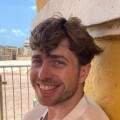
Mongolia is a country rich with history and natural beauty. Landlocked between Russia and China, 80 percent of the nation is covered in grasslands. Many families live on these lands as traveling herders, which has been a traditional way of life in Mongolia for thousands of years. Interestingly, however, the capital city of Ulaanbaatar is home to around half of Mongolia’s population. In recent decades, economic growth has brought people from the grasslands to the capital. Sprawled throughout the city are both tent neighborhoods and modern apartment buildings, showing a unique portrait of Mongolia’s transition to a more urban-centered existence.

Located in the center of Ulaanbaatar, the Mongol Aspiration School has been through a transition of its own. Thanks to its recent partnership with Special Olympics Mongolia, the secondary school is part of the country’s new Unified Schools network made possible by Play Unified: Learn Unified, supported by the Stavros Niarchos Foundation (SNF). The school’s efforts are changing the way the community views people with intellectual disabilities.
Mrs. Enkhsaruul Purevdorj, a history and social science teacher at Mongol Aspiration, leads the school’s public speaking club. She organizes competitions in parliamentary debate and Model United Nations and works to improve the communication skills of her students. In September of 2021, Mrs. Purevdorj extended the club’s membership to students with intellectual disabilities.
She first met students with intellectual disabilities at a Unified event and noticed how the athletes struggled to communicate with her.
“I wanted to talk to [the students with intellectual disabilities], but it was difficult. I could tell they wanted to communicate but they were shy and didn’t really know how to talk to me. So, I wanted to find a way to help.”
This experience kickstarted Mrs. Purevdorj to connect with Special Olympics Mongolia and invite special school students to join her pupils in the public speaking club. On a weekly basis, club members meet with students with intellectual disabilities and work on improving their speaking skills. The students learn how to introduce themselves, how to communicate through drawings, and even study English. The COVID-19 pandemic hasn’t deterred the lessons from happening, as students with and without intellectual disabilities have continued to meet online and work together.

Tsetseehen, a Mongol Aspiration student who assists Mrs. Purevdorj in the Unified club, uses her excellent English skills to help with instruction. She says the experience has given her more empathy and understanding towards people with intellectual disabilities.
“I learned that everyone has potential. It’s not right to judge people for their disabilities and limit their [social] environment,” said Tsetseehen. “People with intellectual disabilities are being discriminated against because of something that they’re not responsible for. So, if it’s not possible for them to change their condition, then why can’t we change our point of view?”
In addition to the public speaking club, Mongol Aspiration continues to increase its involvement with Unified Sports training and activities. One of Tsetseehen’s classmates, Nomiunbileg, represents Mongol Aspiration on the playing field alongside students with disabilities.
Nomiunbileg says building friendships with Special Olympics athletes has become more normal at her school. “I’ve said that I play sports with students with intellectual disabilities, and I’ve had friends say that’s great and they want to join,” said Nomiunbileg.

Like any new experience, Tsetseehen and Nomiunbileg say when working with students with intellectual disabilities, it’s important to just be yourself. “I recommend students behave themselves how they would with other people. Don’t be different, just be yourself!” said Nomiunbileg.
Mrs. Purevdorj and her students are building a new Unified generation across Mongolia, one that will embrace and celebrate differences. Mongol Aspiration is showing that at a Unified School, young people are excited to learn from each other both in the classroom and on the playing field.










